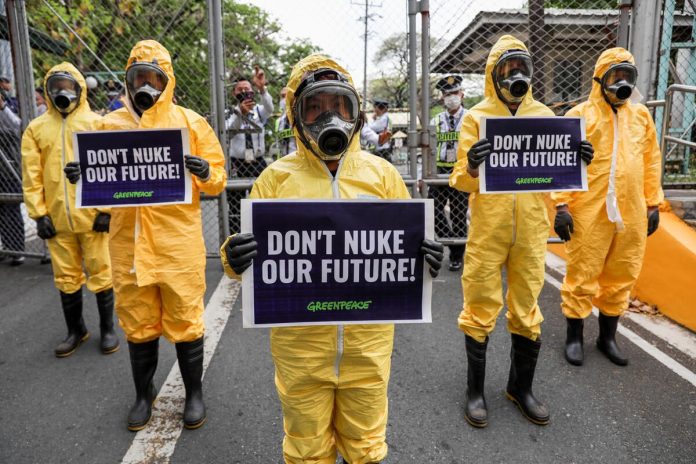Peter Dutton and the Federal Coalition have suggested a shift in Australia’s energy future – one that includes nuclear reactors. This proposal comes with a hefty price tag, environmental and health risks, and a divergence from necessary investments in renewable energy.
The Proposal: A Push for Nuclear Energy
Peter Dutton’s nuclear plan aims to integrate nuclear reactors into Australia’s energy grid to address the country’s increasing energy demands. While he presents this plan as a solution to energy security issues and rising costs, it fails to tackle the underlying causes—an excessive dependence on fossil fuels and insufficient focus on renewables. Despite appearing as a miraculous solution to some, nuclear reactors pose significant risks and long-term consequences that cannot be ignored.
The Risks: A High Price for Uncertain Rewards
Nuclear reactors carry substantial risks. According to Senior Nuclear Specialist Shaun Burnie, implementing nuclear power in Australia would lead to increased energy costs and heightened energy insecurity. He also predicts that embracing nuclear power would hinder Australia from meeting crucial decarbonization goals necessary for the planet’s survival.
Is it truly worth taking such risks at a significant cost to Australia’s economy? Independent experts like CSIRO and AEMO have both stated that nuclear energy generation is twice as expensive as renewables.
The paramount risk associated with nuclear power is waste disposal. Unlike renewable energy sources that do not leave lasting environmental impacts, nuclear reactors produce radioactive waste that remains hazardous for thousands of years. Australia lacks a permanent solution for safely storing nuclear waste due to its vast landmass and diverse environments. The Coalition has not provided a plan for the safe storage or treatment of waste, nor how workers and nearby communities will be safeguarded—experts have debunked the Coalition’s claims about the amount of nuclear waste. A nuclear waste incident could contaminate local areas for decades or even centuries. Additionally, the costs of storing and treating nuclear waste are unknown. Nuclear power is a costly gamble that is not worth pursuing.
Nuclear reactor plants are susceptible to catastrophic accidents. Historical nuclear disasters at Chernobyl (1986) and Fukushima (2011) underscore the potential dangers of nuclear energy. Burnie, who has witnessed the aftermath of nuclear disasters firsthand, advises Australia against the dangers and expenses associated with nuclear power, stating that “Australia cannot afford the policies of the Coalition. Nuclear power is too dangerous, too expensive, and too slow.”
The Stalling of Renewable Investment
One of the most troubling outcomes of Dutton’s nuclear proposal is its potential to halt investments in renewable energy technologies and prolong the reliance on fossil fuels. Australia possesses abundant natural resources for renewable energy, from ample sunlight for solar power to strong winds for wind energy. Investing in these technologies would lead to job creation, economic stimulation, and, most importantly, aid the country’s transition to a cleaner, more sustainable energy future.
Nuclear reactors act as a distraction, prolonging the use of coal and gas. Opting for nuclear energy would bind Australia to coal and gas for decades, waiting for nuclear power to become operational. Dutton’s plan serves as a delaying tactic to bolster environmentally damaging coal, oil, and gas for as long as possible, hindering the advancement of clean renewable energy crucial to reducing climate pollution. Only the fossil fuel sector benefits from nuclear energy, while the rest of the population pays the price for worsening climate impact.
Considering that Australia is already over 40% reliant on solar and wind power, there is no need to initiate nuclear power from scratch. Renewables grow more cost-effective each day. By fixating on nuclear power, Dutton’s plan steers attention and resources away from renewables, jeopardizing the progress made in the renewable energy industry.
Australia Can’t Afford the Risk
Australia cannot bear the risks tied to nuclear reactors. A nuclear accident or mishandling of radioactive waste would have catastrophic effects on the environment and communities. The resources necessary to manage and mitigate these risks would be substantial, diverting vital funds from more promising and sustainable energy solutions. For instance, the Fukushima Daiichi nuclear disaster, including cleanup, compensation, and long-term repercussions, is estimated at more than $200 billion (USD).
Australia’s energy future hinges on making sound choices now. The imperative is clear: transitioning away from fossil fuels urgently and investing in safe, reliable renewable energy technologies capable of underpinning a sustainable future.
The transition to renewable energy is already in progress, with states like South Australia and Queensland leading the way with their ambitious renewable energy targets.
By opting for nuclear power, we undermine these efforts and entrench ourselves in an expensive, hazardous, and obsolete energy system. Australia’s clean energy future is within grasp, but only if we concentrate our resources on the technologies that will truly revolutionize the energy sector—solar, wind, and battery storage.
A Call to Action
Collectively, we must advocate for policies that prioritize environmental protection and the shift to a sustainable energy future. Peter Dutton’s nuclear proposition is a perilous distraction from the urgent need for a renewable energy revolution. The risks associated with nuclear reactors, combined with the opportunity cost of delaying renewable energy investments, render this proposal unwise and costly for Australia.
It is time to invest in the future, rejecting risky and antiquated technologies. We must demand that our leaders prioritize the health of our planet and the well-being of future generations by embracing renewable energy, shunning nuclear power, and accelerating the transition to a clean energy future.




